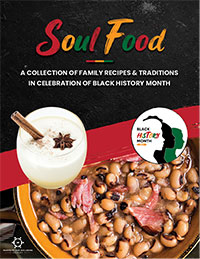Education | February 27, 2023
From Poignant TED Talks to a Live Concert, ASI’s Diversity & Inclusion Council Celebrates Black History Month
The D&I Council also compiled a soul food cookbook and hosted a virtual presentation from the W.E.B. Du Bois Scholars Institute.
Hasan Kwame Jeffries, a historian of African American ancestry, ran his fingers along the bricks in the cellars of Montpelier, the mansion once owned by founding father James Madison.
As he did so, Jeffries felt grooves and undulations in the bricks. He soon realized that the ridges were the handprints of enslaved children who had made the bricks.
The irony and sadness of it all hit him like an uppercut.
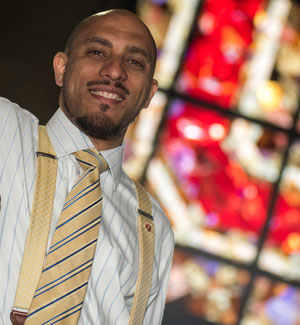
Hasan Kwame Jeffries is an associate professor at The Ohio State University.
In the home where America’s fourth president had pondered the Bill of Rights in the library upstairs, the bricks that formed the backbone of the building were built by enslaved African Americans. Madison was an owner of some 100 people, never freeing any, Jeffries said.
“This is the type of hard history we tend to ignore,” Jeffries stated. However, it’s exactly the kind of history that the United States needs to confront and learn from in order to eradicate the ongoing inequalities that continue to plague communities of color, he asserted.
“My concern is that if we don’t remember the past, we will continue it,” Jeffries said. “We will continue to do the things that created inequality in the first place. We must disrupt the continuum of hard history. We must do the things that bend the moral arc of the universe toward justice.”
Jeffries discusses “hard history” in this TED Talk.
The historian delivered the poignant speech during a TED Talk – “Why We Must Confront the Painful Parts of American History” – that ASI’s Diversity & Inclusion Council showed during an employee education session. The session was part of the recognition and celebration by ASI of Black History Month.
Other D&I Council Black History Month initiatives, which you can read more about below, included compiling a soul food cookbook, hosting a virtual presentation by the W.E.B Du Bois Scholars Institute, and holding an on-site live concert focused on Black music in the 20th century.
Becoming ‘Ripples of Hope’
At the session on Feb. 22, attendees viewed the speech from Jeffries as well as another TED Talk entitled “How Racism Makes Us Sick.” It was delivered by David R. Williams, a public health and sociology professor at Harvard University whose research focuses on how social factors like education, income and race affect physical and mental health.
In his talk, Williams presented anecdotes and research that emphasized that embedded racism in American society is contributing to profound deleterious impacts on the health of the Black community.
Factors such as major experiences of discrimination, what Williams described as everyday discrimination, and even pervasive poorer medical care resulting from discrimination – whether intended or subconscious – are all contributing to a spectrum of health problems for Black people. These issues often result in them dying earlier than other groups, Williams said.
“Racism is producing a rigged system,” Williams asserted.
David R. Williams discusses how “racism makes us sick” in this TED Talk.
Even so, Williams shared examples of encouraging initiatives that aim to counteract racism and the subsequent health effects of discrimination in the Black community.
These include, he said, a freshman-year health assessment as part of freshman orientation at Oakwood University – something that, with related supports and tools, can lead to a healthier adulthood. He also pointed to psychologist Patricia Devine’s work on implicit bias. He called these and other examples “ripples of hope.”
“Each one of us,” Williams said, “can be a ripple of hope.”
After watching videos of each talk, employees engaged in discussion about things they learned, poignant points that struck them, and even personal experiences of racism and its repercussions – all of which dovetailed off themes Jeffries and Williams emphasized.

“Each one of us can be a ripple of hope.” – David R. Williams
Some comments centered on the disparity between what might often be taught in schools about American history and what is left out – the hard history that Jeffries mentions. Others said their eyes were opened regarding the “subtler” or more “everyday” types of discrimination and implicit bias.
Caitlyn Macikanycz, a supplier specialist in supplier services, said it’s important to keep self-examining and exposing biases you may not know you have – to keep having conversations and to “get outside your circle” to grow in understanding.
ASI Employee of the Year Stephanie Turner-Scott, executive director of ASI Show Operations, shared about incidents of racism she has endured and how she feels they’ve weighed on her physical and mental health. “It still continues to happen,” Turner-Scott said of discrimination. There was one somewhat recent incident “so profound that it almost sent me to therapy,” she said.
Reflecting on Jeffries’ talk about historical practices of racism continuing to shape the Black experience today, Supplier Sales Manager Brian White shared how his prior career in the mortgage business showed him that redlining is sadly alive and well today. Commenting on Williams’ speech, White said one of the solutions to the health inequity crisis in the Black community is greater diversity in the medical field.
“We need more Black and Brown doctors and nurses,” White said.
Creating Opportunities for Youth to Thrive
To kick off the Black History Month observance, ASI hosted a virtual presentation with administrators from the W.E.B. Du Bois Scholars Institute at Princeton University. Dr. Sherle Boone, founder and CEO of the 35-year-old program, told attendees that it was established in reaction to the ongoing debate about affirmative action that had reached a fever pitch in the mid to late 1980s.
The annual summer program, which includes multiple academies that provide college-level courses to participants, caters to high-performing middle and high school students from traditionally underrepresented groups.
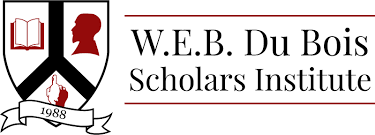
The W.E.B. Du Bois Scholars Institute was established in 1988 to offer college-level coursework to ambitious younger students from underrepresented groups.
“It’s influenced by the thinking of Du Bois, who believed that the best leadership is provided by the best and brightest minds,” said Boone, of the Black historian and civil rights activist from the turn of the 20th century. “Our focus is on high achievers, those who will do the most good and who want to be of service helping victims of racial oppression. We want to develop and sustain leadership potential.”
Dr. Mark Ellis, dean of academic affairs for the Institute, and Crystal Watson, senior program manager, joined Boone to share information about the different programs.
“We offer rigorous college-level coursework,” said Watson, “plus instruction in professional development and self-development.” Ellis said they strive to transform participating students into “change agents.”
“In addition to critical reading and writing, we have them do group work,” said Ellis. “They can identify the areas where they converge and diverge in thinking and work together to solve problems collectively.”
Download the Diversity & Inclusion Council’s Soul Food cookbook. Recipes were submitted by employees.
Students must apply to the program and undergo a rigorous selection process before being invited to participate.
Theresa Pride, customer success manager in Distributor Services, appreciated that the program emphasizes both academic excellence and community leadership. “Black History must also look forward, and these students, the best and the brightest, represent our future,” she said. “They must be nurtured to use their talents for the benefit of our nation.”
The Institute gives a diverse group of students an opportunity they might not otherwise have, said Leena Patel, ESP Electronic Imaging team lead for ESP Information. “We can support our youth by supporting these types of programs,” she said. “The Institute strengthens students to become young leaders who want to make a positive change in their communities.”
Cristina Alcine, advertising/marketing services coordinator in Production & Advertising Operations, participated in a similar type of program when she was in high school, so she knows first-hand how valuable they can be to young people.
“We need to create opportunities and spaces for youth to thrive,” she said. “We need to challenge them to think and dream bigger than what is presented directly in front of them. It’s important that we all share our resources and connections, provide words of encouragement as they’re figuring things out, and show up as a reminder that we’re in their corner during their journey towards success.”
Concert Celebrates Black Music of the 20th Century
The week after the W.E.B. Scholars talk, ASI hosted an onsite jazz performance featuring two local artists: Keith Spencer, an experienced baritone singer, and accompanist Peter Hilliard, music director of Villanova University’s Graduate Theatre Program.
Spencer and Hilliard guided attendees through a survey of Black music during the 20th century, with Spencer singing a variety of pieces – from spirituals like “Let My People Go,” “Joshua Fit the Battle of Jericho” and “No More Auction Block for Me,” to “Ol’ Man River” from Show Boat and “That Old Black Magic” from the Great American Songbook.
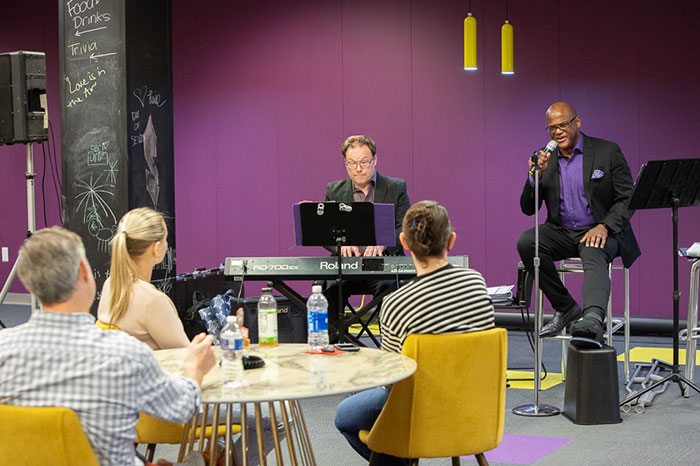
Keith Spencer and Peter Hilliard perform for ASI employees.
Show Boat from 1927 in particular was “a major pivot in American musical theater,” said Spencer. It was the first time a Black character was presented as a serious one, grappling with the weighty issues of life, rather than as a minstrel or buffoon for comedic relief.
Spencer added that during the Civil Rights era, many of the freedom- and liberation-themed songs with Biblical roots from the late 19th and early 20th century, such as “Let My People Go” and “Joshua Fit the Battle of Jericho,” became popular once again as people advocated for large-scale societal change. American singer/songwriter Bob Dylan was so struck by “No More Auction Block for Me” that he took the melody and put new lyrics to it – he called it “Blowin’ in the Wind” and released it in the early 1960s.
Keith Spencer and Peter Hilliard recently joined violinist Claudia Pellegrini in the local WRTI 90.1 Performance Studio for a rendition of “Ol’ Man River.”
“They were wonderful,” Meagan Reilly, member support specialist in the Customer Service department, said of Spencer and Hilliard. “Through the singing and accompanying music, they taught us lessons of the struggles the Black community has gone through. Learning about the past is important for moving forward.”
Liz Italia, executive director of marketing content, appreciated that employees were given a unique opportunity to learn about history and culture through music. “It was a celebration of beauty that came from conflict and difficulty, but also creativity and perseverance,” she said. “I was very moved and felt like we were all connected in that room at the same time, which is what sharing culture is really about.”
*Sara Lavenduski contributed to this report.
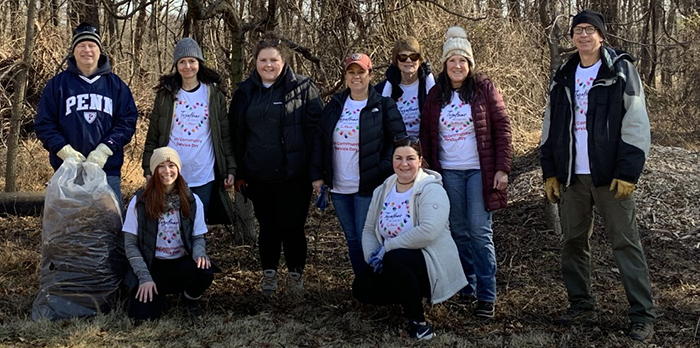
ASI Employees Give Back to the Community
ASI also hosted an employee Community Service Day on Thursday, February 2. “Our amazing volunteers assembled 250 snack bags and created caring notes for Caring for Friends, packed 100 weekend meal kits and wrapped 100 sets of utensils for Trenton Area Soup Kitchen, removed 253.6 lbs. of invasive plants from Silver Lake Nature Center, and created floral arrangements with seniors at Horsham Center For Jewish Life,” says Shelby Kay, senior human resources manager. “In addition, we held four payroll campaigns, offering employees the opportunity to make monetary donations to one (or more) of these charities.”


